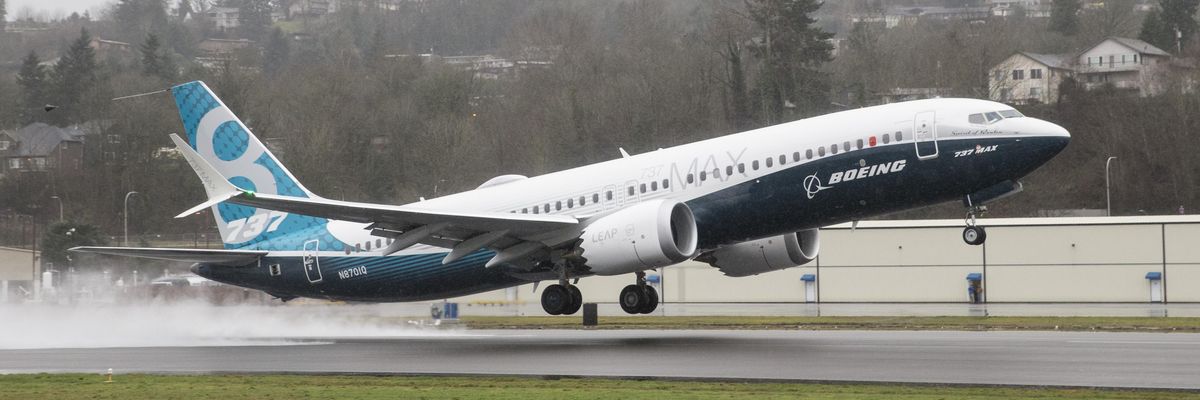Federal prosecutors have recommended that the U.S. Department of Justice criminally charge Boeing for violating a 2021 settlement over two fatal crashes of the aerospace giant's troubled 737 MAX jetliners.
As
Reutersreported Monday:
In May, officials
determined the company breached a 2021 agreement that had shielded Boeing from a criminal charge of conspiracy to commit fraud arising from two fatal crashes in 2018 and 2019 involving the 737 MAX jet. Under the 2021 deal, the Justice Department agreed not to prosecute Boeing over allegations it defrauded the Federal Aviation Administration so long as the company overhauled its compliance practices and submitted regular reports. Boeing also agreed to pay $2.5 billion to settle the investigation.
The Department of Justice (DOJ) said Boeing violated the settlement by "failing to design, implement, and enforce a compliance and ethics program to prevent and detect violations of the U.S. fraud laws throughout its operations."
Boeing declined to comment on the Reuters report. Referring to the settlement, the company said last month that "we believe that we have honored the terms of that agreement."
The DOJ has until July 7 to decide whether to prosecute Boeing officials.
News of the prosecutors' recommendation came days after
The New York Timesreported that the DOJ is considering letting Boeing avoid prosecution for violating the terms of the 2021 settlement. According to the Times, the department is weighing a negotiated resolution under which the company takes a plea deal or deferred prosecution agreement (DPA)—which would impose monitoring and compliance terms—in lieu of a trial fraught with uncertainties.
Boeing entered into a DPA after 737 MAX jets crashed, killing hundreds of people. On October 29, 2018, Lion Air Flight JT610, a nearly new 737 MAX 8, crashed into the Java Sea shortly after taking off from Jakarta, Indonesia, killing all 189 passengers and crew on board. Indonesian investigators subsequently concluded that a faulty sensor caused the plane's Maneuvering Characteristics Augmentation System (MCAS) to continually tilt the aircraft downward.
On March 10, 2019, Ethiopian Airlines Flight 302, also a MAX 8, crashed into a field six minutes after taking off from Addis Ababa, Ethiopia en route to Nairobi, Kenya. All 157 people aboard were killed. Boeing
acknowledged that a MCAS-related software error caused the crash and vowed to "prevent erroneous data from causing MCAS activation."
As Boeing whistleblowers—who claim they've been retaliated against—and outside aviation safety experts
revealed what consumer safety advocate Ralph Nader described as "serial criminal negligence" in the company's handling of the crisis, public pressure urging the government to ground all 737 MAX planes increased. Then-Republican U.S. President Donald Trump finally did so on March 13, 2019 amid a worldwide wave of groundings that lasted until December 2020 in the United States and longer in some countries.
Yet problems persisted. Earlier this year, a
door plug flew off a 737 MAX 9 during an Alaska Airlines flight, injuring passengers and forcing an emergency landing. The incident also prompted a temporary MAX 9 grounding and a DOJ criminal probe. The FAA found "multiple instances" in which Boeing and Spirit AeroSystems—a parts supplier—"allegedly failed to comply with manufacturing quality control requirements." The agency also noted "noncompliance issues in Boeing's manufacturing process control, parts handling and storage, and product control."
Last week, relatives of the 737 MAX 8 crash victims
urged federal prosecutors to file criminal charges against Boeing and fine the company $25 billion.
U.S. Sen. Richard Blumenthal (D-Conn.)—a former federal prosecutor and state attorney general—said last week at a hearing on Boeing's broken safety culture that "the evidence is near-overwhelming to justify" DOJ prosecution.
"Boeing needs to stop thinking about the next earnings call and start thinking about the next generation," Blumenthal said, echoing
allegations that the company prioritizes profit over safety.
Boeing CEO Dave Calhoun said at the hearing that he is "proud of every action" his company has taken in response to the 737 MAX safety crisis. Calhoun announced in March that he would step down as CEO at the end of the year—a move critics called insufficient if there is no criminal accountability.
Monday's reporting followed news that two NASA astronauts who left Earth aboard Boeing's
Starliner are stranded on the International Space Station after engineers found numerous problems with the reusable capsule. Astronauts Butch Wilmore and Suni Williams were scheduled to return to Earth on June 13 after a week aboard the ISS. This is the third time their return home has been delayed. The Starliner is docked to the ISS' Harmony module and has just 45 days of docking time left before the window for a safe return closes.
